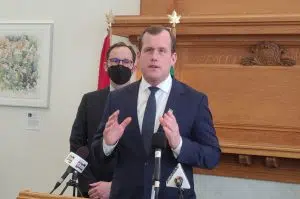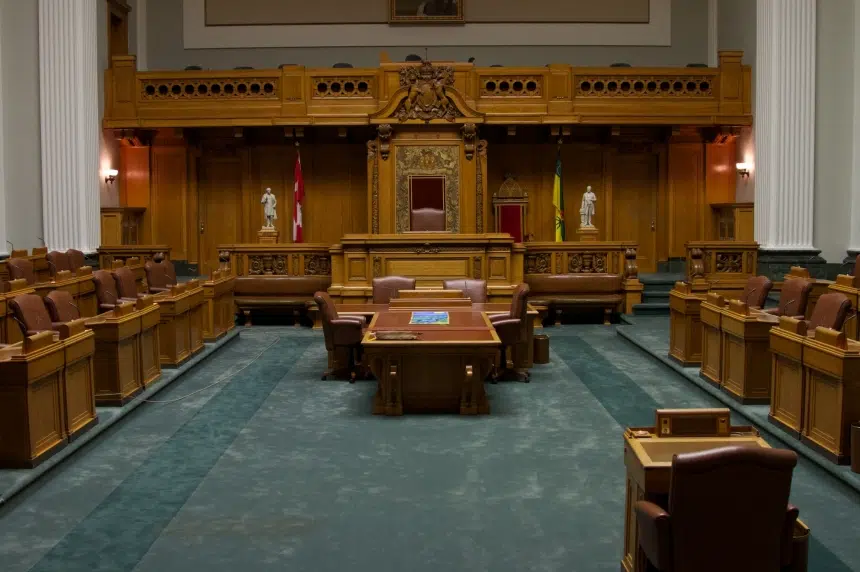Saskatchewan’s finance minister sees the expansion of the Provincial Sales Tax and the projected reduction of the surgical wait list as a tradeoff.
“(The expanded PST) will generate annually a little over $20 million and it’s interesting that our surgical wait list initiative is also a little over $20 million,” Donna Harpauer told reporters before delivering the 2022-23 budget Wednesday.
“If I said to a Saskatchewan resident, ‘Would you be willing to pay this for maybe two concerts and a Rider ticket in order for us to address the very critical surgical wait list?’ — because if we’re not that someone, we all know someone in our family that their quality of life isn’t what it should be because they need a hip or knee replacement — I think Saskatchewan people will support that.”
Starting Oct. 1, the province will charge the PST on items on which the GST is already collected, including green fees and gym memberships, and tickets to concerts, museums, movies, fairs and sporting events — including Saskatchewan Roughriders games.
One of the government’s focuses in the budget is to reduce the surgical wait list that ballooned during the COVID-19 pandemic. By March of 2025, the government hopes wait lists will be back to pre-pandemic levels.
To address the backlog, the province is looking to recruit and retain health-care professionals.
“It would be very, very difficult to have the capacity to address the entire surgical wait list in one year,” Harpauer said. “It takes a lot of people, a lot of highly trained health-care professionals, so we also need to build the health-care professionals as well that can address that.”
Non-renewable resource revenue was a main factor in the government forecasting a deficit of $463 million, down by $2.1 billion from the deficit that was forecast.
The province also was able to write down its operating debut by $450 million thanks to the rising prices of potash and oil.
If it continues to benefit from market volatility, that will result in further discussions.
“Should, in particular, potash and oil prices be much stronger than what we’re projecting, that will be future discussions as to what would be a wise decision on how that money will be spent,” Harpauer said.
“What I really don’t think we’re going to do is fall in the trap of putting it in ongoing year-over-year operating costs because we fell in that trap before and it does not bode well for the province.”
Investment by businesses looking to expand their operations in Saskatchewan also could be a boon in the future.
“As those workers come in, it’s going to help our restaurants, it’s going to help our small businesses (and) it’s going to help everybody,” Harpauer said.
“Rather than doing cuts now, let’s invest the money in places where people want it and will expect it and let’s get this province growing and that deficit will narrow as we go forward when we get some economic activity accelerating within our province.”
NDP responds
The Saskatchewan NDP view the budget as one that doesn’t help the people in the province.
“It baffles me that this government — at a time when folks are facing such extraordinary costs, at a time where they’ve endured so much by way of the pandemic, at a time when they’ve been asked to stay apart and do their part and they have –that now instead of providing some relief, we have a government that’s actually sticking them with more taxes and more costs,” Finance Critic Trent Wotherspoon said. “This is a no-help budget.”

NDP Finance Critic Trent Wotherspoon and NDP Leader Ryan Meili react to the 2022-23 Saskatchewan budget on March 23, 2022. (Britton Gray/980 CJME)
The NDP claims the budget doesn’t provide any new relief for families and people, but instead brings in 32 new taxes or fees. Those include the expansion of the PST.
“Sticking those costs on those events that bring us together and support the arts and allow us to celebrate, it defies common sense and it’s a government cranking up costs on people and out of touch with where Saskatchewan people are at,” Wotherspoon said.
Those changes will come into effect Oct. 1.
Wotherspoon said Saskatchewan people need relief in areas, such as at the pumps where people are spending more.
“We think it’s entirely reasonable that we would see a temporary stay on the fuel tax here in Saskatchewan — 15 cents a litre — in a similar way as they’ve done in Alberta,” Wotherspoon said.
“Just the same, those dollars for a period of time could have been discharged in the way of a relief rebate to Saskatchewan people. I was astounded when I looked at the budget to not see that here today.
“We also don’t see any reductions to some of the things we have been calling for — a reduction of the PST on children’s clothes and on restaurants.”
As the country and province continue to try and reach the end stages of the COVID-19 pandemic, more health-care funding has been provided. But current NDP Leader Ryan Meili doesn’t think it does enough.
“We see an increase but it is less than the cost of inflation,” he said. “We have 40,000 people waiting for surgeries. We have massive challenges that have been revealed, we have doctors leaving the system and we still don’t know whether we will see other serious waves that will affect our health-care system.
“Health care in Saskatchewan was run to the red line for years. The pandemic has revealed how bad it is and this budget doesn’t get anywhere close to fixing the problem.”
Meili said the government’s announcement when it comes to surgical wait times was made two years ago and was “a recycled announcement on surgeries that will go nowhere near what we need to address the huge backlog.”
“What I haven’t seen this government acknowledge is the choices that they made along the way that have increased those surgical backlogs, that have made it harder for people to access primary care,” Meili said.
Wotherspoon also took issue with the government’s resource revenue projections, saying that while they are high, he feels they are likely understated.
“If you look at the potash volumes that are booked in this budget, they are far below any of the private sector forecasts we are seeing right now and if you’re looking at the forecasts for the year on oil and gas, they are below as well,” Wotherspoon said.
“I feel that the government is doing this in a deliberate way to manage political expectations when really what they should be doing for Saskatchewan people facing a crushing cost of living at this time, they need to provide them some relief.”
There are also no major capital projects planned for the government this year. Meili said there are a number of projects the government could have chosen to do.
“I’m certainly concerned when there are lots of infrastructure needs including new schools (and) we see nothing for long-term care at a time where it has been so clearly demonstrated those facilities are falling apart and need to be fixed. (It’s strange) that we would put a pause on infrastructure that matters,” Meili said. “If you’re concerned about labour force, why are you cutting labour force supports?”
Wotherspoon said this should be a time where the province secures an economic future for the province and increase the labour force.
“Instead, this government has slashed labour force development by 41 per cent in this budget. It doesn’t help extend opportunity, it doesn’t help ensure people have the opportunity for good jobs as we move forward and it hampers our economic recovery,” Wotherspoon said.
Wotherspoon said the increase in funding for the film industry is welcome.
“We’re glad to see some recognition that (cutting the film tax credit) was the wrong thing to do but this has cost Saskatchewan people. It has cost our economy a sector that could have been providing hundreds of millions of dollars annually,” Wotherspoon said.
“It seems like it might be a bit of a half-measure on this front and it seems as well that it may not place us in a competitive position as we need to be with Manitoba and Alberta.”
Wotherspoon said this is a government that drained its rainy day fund and didn’t take advantage of boom years, tripling the debt before the pandemic.
“Saskatchewan people should expect and deserve a fiscally responsible government and a path back to getting us back on track,” Wotherspoon said. “Right now not helping Saskatchewan people hampers our economy and costs us in the long run.”
— With files from 980 CJME’s Britton Gray







